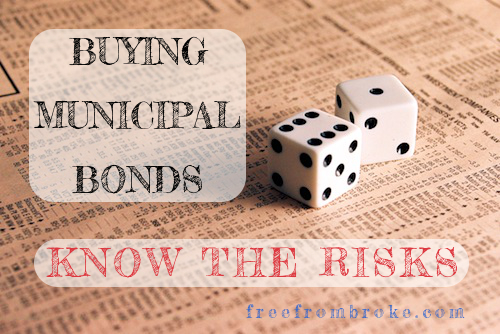One of the more popular investment strategies during tough economic times is to turn to bonds.
Bonds are considered relatively safe, when you invest in entities that are highly rated and stable. Since you are supposed to get your principal back (barring a default), plus a small amount of interest, many people like the idea of bonds.
A type of bond that has seen an increase in popularity recently is the municipal bond.
Municipal bonds are issued by localities. They often come with higher yields than Treasury securities and even many corporate bonds. On top of that, there are tax advantages to investing in municipal bonds.
But before you decide to take the plunge with municipal bonds, make sure that you understand how they work, and the types of risks involved.
How Do Municipal Bonds Work?

There are two main types of municipal bonds:
- General Obligation: These are bonds issued in an effort to raise revenue for various purposes. They are not attached to a specific project, and the backing is usually in the form tax revenues from local residents, or from the general fund.
- Revenue: These are bonds issued with the purpose of funding a specific project. There is usually hope that the project, when complete, will generate revenues that can then be used to repay the bonds (with interest). Many non-profit organizations, including hospitals, make use of revenue bonds.
Basically, you invest in a bond, and the money is used to complete a project, or provide immediate revenue for a local government. You receive regular interest payments (that aren’t taxed by the federal government), and then you are expected to receive your principal back at the end of the term.
For those looking for higher yield, this can be an interesting choice.
However, it’s important to realize that there are still risks. Many investors think that because most municipal bonds are issued by local governments, they are “safe.” Additionally, there are also those that believe that a municipal bond issued by a college or hospital is likely to be a “sure thing.”
This isn’t the case. While many consider most municipal bonds to be reasonably secure, there are still risks.
Risks Associated with Municipal Bonds
Before you invest in anything, you should understand the risks involved. This goes for municipal bonds as well as for any other type of asset.
Some of the things to take into consideration as you decide on municipal bonds include:
Purpose of Financing
It can be comforting to buy a revenue bond with the expectation of being backed by future income for an entity. However, it’s important to take a look at the purpose of the bond. Why is the financing needed? What is the project?
It’s one thing to buy a revenue bond to finance the building of a toll system on a busy highway, and quite another to invest in bonds connected to speculative for-profit (or even not-for-profit) venture.
Make sure that you understand the project, and that you understand the feasibility of the project. If the project turns out to be a bust, you might lose money.
Non-Recourse
Check to see if the municipal bond you are investing in is non-recourse. This means that if the revenue flow trickles to a stop, you don’t have other recourse. This means that you need to be on top of the situation. If something goes wrong, you are out of luck if you have a non-recourse bond.
Stability
Don’t forget to look at the stability of the entity issuing the bond. If you are investing in general revenue bonds from a particular city, figure out if you trust the management of the city, and the stability of the city’s finances. You might be able to get a higher yield with a city that seems a little desperate, but you’ll also experience a higher risk of default.
Also, don’t forget about interest rate risk. Even though many municipal bonds offer higher yields than many other types of bonds, the yields might still be somewhat low. In some cases, your return won’t beat the rate of inflation. In that case, you lose purchasing power over time. That’s something to consider as well before you invest in municipal bonds.
Nice overview of munis Miranda! I think they can be a great tool in your portfolio, as long as they fit your need. If not, there are much better things you could be putting your money in.
This is a good balanced article with some wise “buyer beware” advice. For many years I was naive enough to think that government related investments were safe and boring. That applied to local or central government, but oh how wrong I was. In the current financial environment. Government issues do carry risk, as Miranda points out, so maybe they should be thought of risky and boring.
That is not to say that “boring” investments should not be part of a personal investment portfolio.
I think most average investors could do well with boring. It’s the “exciting” stuff that gets us into trouble buying and selling at the wrong times.